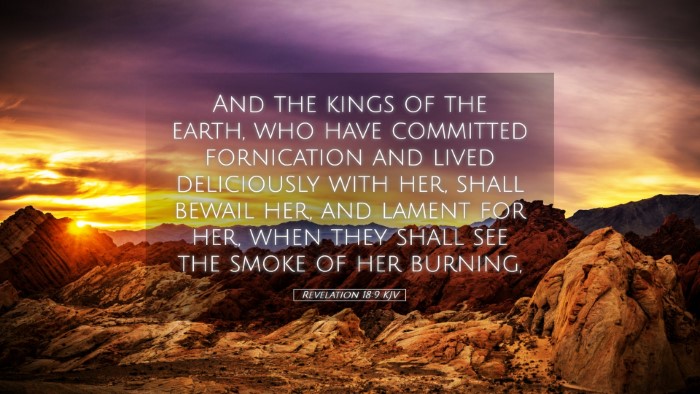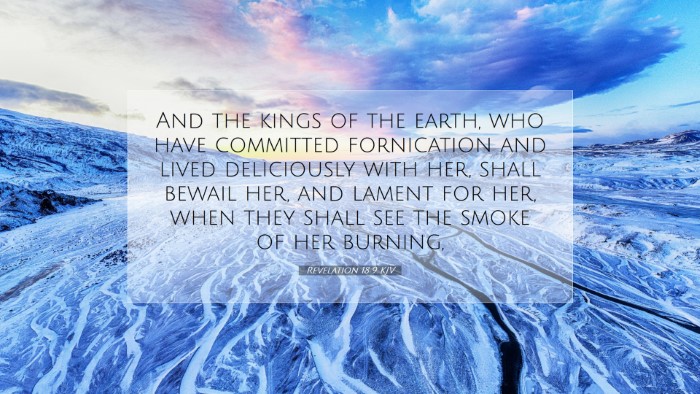Commentary on Revelation 18:9
Text of Revelation 18:9 (KJV): "And the kings of the earth, who have committed fornication and lived deliciously with her, shall bewail her, and lament for her, when they shall see the smoke of her burning."
Introduction to Revelation 18
The chapter serves as an elaborate prophecy concerning the fall of "Babylon," a representation of the great urban center of commerce, idolatry, and wickedness. As we examine verse 9, we delve into the reactions of the ruling powers of the world to the imminent judgment of this entity. This verse illustrates the deep connections established between earthly powers and the corrupt economic and spiritual systems represented by Babylon. By consulting various public domain commentaries, we gain meaningful insights into the profound implications this has for believers and scholars alike.
The Kings of the Earth
Matthew Henry Commentary: Henry assigns significance to the title "kings of the earth," emphasizing their alliance with Babylon's corrupt practices. Their "fornication" alludes to spiritual unfaithfulness towards God, as these rulers have indulged in the temptation of wealth and debauchery provided by Babylon. The kings are not merely passive observers but active participants in the system, therefore, their mourning signals a profound loss of power and influence.
Albert Barnes Notes: Barnes elaborates on the "fornication" phrase, interpreting it as a metaphor for idolatrous alliances between earthly rulers and Babylon. This unfaithfulness carries not only moral implications but economic and political entanglements as well. By aligning themselves with Babylon, the rulers betray their covenant with God, risking His wrath.
The Reaction to the Fall
The latter part of the verse states that these kings "shall bewail her, and lament for her." This indicates a sense of loss, not just of a corrupt system, but of the luxurious lifestyle and power that came with it. Each commentator provides a unique perspective on this lamentation.
Adam Clarke Commentary: Clarke highlights the severity of their loss. This lamentation signifies the collapse of the economic structures that provided wealth and status to these leaders. The smoke of her burning symbolizes the complete spiritual desolation resulting from her divine judgment. Clarke suggests that their wailing reflects more concern over their own demise than the moral implications of Babylon's destruction.
Matthew Henry Adds: He articulates that the loss felt by these kings is not solely financial; it is a catastrophic loss of their ability to manipulate and control society through their alliance with Babylon. The lamenting kings symbolize all political and economic arrangements that forsake God’s justice, showcasing the inevitable downfall of human pride and ambition.
The Smoke of Her Burning
The imagery of "the smoke of her burning" serves as a powerful symbol of judgment and destruction.
Albert Barnes Commentary: Barnes comments on the smoke as a representation of God’s judgment against sin and idolatry. The smoke not only indicates destruction but also serves as a warning to those who would follow in Babylon's footsteps. It suggests the permanence of judgment; once Babylon is destroyed, she cannot rise again, affirming God’s ultimate authority over human institutions.
Adam Clarke's Insight: Clarke emphasizes that this smoke serves a dual purpose; it proclaims the certainty of judgment and acts as a signpost for all nations and rulers to witness the fate that befalls those who oppose God. There is both a physical reality (the smoke) and a spiritual lesson; it is a definitive act, a divine statement against corruption, akin to the fate of Sodom and Gomorrah.
The Theological Implications
This verse signifies a dramatic revelation in revealing the interplay between earthly powers and divine sovereignty. It serves as a reminder for theological reflection in various contexts:
- Divine Judgment: The systematic destruction of Babylon highlights God's control over history and His power to judge nations and systems of governance.
- Faithfulness in Leadership: Pastors and leaders are challenged to reflect on their alignments with the world's systems. This passage prompts a reevaluation of what it means to be faithful to God’s covenant amidst corrupt practices.
- The Nature of True Wealth: The lamentation of the kings signifies an important lesson on the nature of true wealth in God’s economy, juxtaposing temporal riches against eternal values.
Conclusion
Revelation 18:9 serves as an essential beacon for understanding the dynamics of power, idolatry, and divine retribution. By integrating insights from Matthew Henry, Albert Barnes, and Adam Clarke, readers are presented with a multifaceted exploration of the verse that underscores the transient nature of earthly alliances forged in sin. The reflections offered herein call upon pastors, scholars, and students to diligently consider their own lives against the backdrop of Biblical history, God’s righteousness, and the fate of those who choose to align themselves against Him.


